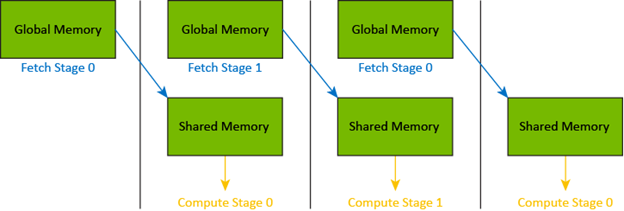Pipelining
Instruction-level parallelism (ILP) is a technique used to improve the performance of processors by executing multiple instructions simultaneously. In the context of GPU programming, we can apply ILP to overlap memory operations with computation, effectively hiding memory latency.
Overlapping Global-to-Shared Copies with MMA Computation
We can overlap global-to-shared memory copies with MMA (Matrix Multiply-Accumulate) computation. This is achieved by prefetching the next tile of data from global memory into shared memory while the current tile is being processed.

To implement this, we explicitly load data from shared memory to registers for the MMA computation and initiate a new load from global memory to shared memory for the next tile before starting the computation.
function matmul_kernel(A, sA_layout, copy_A,
B, sB_layout, copy_B,
C, mma_C)
sA = MoYeSharedArray(eltype(A), sA_layout)
sB = MoYeSharedArray(eltype(B), sB_layout)
mA = MoYeArray(A)
mB = MoYeArray(B)
mC = MoYeArray(C)
bM = size(sA_layout, 1)
bN = size(sB_layout, 1)
bK = size(sB_layout, 2)
gA = @tile mA (bM, bK) (blockIdx().x, :)
gB = @tile mB (bN, bK) (blockIdx().y, :)
gC = @tile mC (bM, bN) (blockIdx().x, blockIdx().y)
# Copy partition
thr_copy_a = get_slice(copy_A, threadIdx().x)
tAgA = partition_S(thr_copy_a, gA) # (CPY, CPY_M, CPY_K, k)
tAsA = partition_D(thr_copy_a, sA) # (CPY, CPY_M, CPY_K)
thr_copy_b = get_slice(copy_B, threadIdx().x)
tBgB = partition_S(thr_copy_b, gB) # (CPY, CPY_N, CPY_K, k)
tBsB = partition_D(thr_copy_b, sB) # (CPY, CPY_N, CPY_K)
# Copy gmem to smem for k_tile=1
copyto!(copy_A, tAsA, view(tAgA, :, :, :, _1))
copyto!(copy_B, tBsB, view(tBgB, :, :, :, _1))
# MMA partition
thr_mma = get_slice(mma_C, threadIdx().x)
tCsA = partition_A(thr_mma, sA) # (MMA, MMA_M, MMA_K)
tCsB = partition_B(thr_mma, sB) # (MMA, MMA_M, MMA_K)
tCgC = partition_C(thr_mma, gC) # (MMA, MMA_M, MMA_N)
# MMA registers
tCrA = make_fragment_A(thr_mma, tCsA) # (MMA, MMA_M, MMA_K)
tCrB = make_fragment_B(thr_mma, tCsB) # (MMA, MMA_N, MMA_K)
tCrC = make_fragment_C(thr_mma, tCgC) # (MMA, MMA_M, MMA_N)
zeros!(tCrC)
k_max = size(tAgA, 4)
for k in 1:k_max
cp_async_wait()
sync_threads()
# Copy from smem to rmem
copyto!(tCrA, tCsA)
copyto!(tCrB, tCsB)
sync_threads()
if k < k_max
copyto!(copy_A, tAsA, view(tAgA, :, :, :, k+1))
copyto!(copy_B, tBsB, view(tBgB, :, :, :, k+1))
end
@gc_preserve gemm!(mma_C, tCrC, tCrA, tCrB, tCrC)
end
copyto!(tCgC, tCrC)
return nothing
endDouble Buffering
We can also overlap shared-to-register memory copies with MMA computation using a technique called double buffering.
This involves allocating two shared memory buffers: one for the current computation and one for prefetching the next tile. We asynchronously prefetch the next tile from global memory to the second shared memory buffer while the first is being used for computation.
@views function matmul_kernel(A, sA_layout, copy_A,
B, sB_layout, copy_B,
C, mma_C)
sA = MoYeSharedArray(eltype(A), sA_layout) # (bM, bK, 2)
sB = MoYeSharedArray(eltype(B), sB_layout) # (bN, bK, 2)
mA = MoYeArray(A)
mB = MoYeArray(B)
mC = MoYeArray(C)
bM = size(sA_layout, 1)
bN = size(sB_layout, 1)
bK = size(sB_layout, 2)
gA = @tile mA (bM, bK) (blockIdx().x, :)
gB = @tile mB (bN, bK) (blockIdx().y, :)
gC = @tile mC (bM, bN) (blockIdx().x, blockIdx().y)
# Copy partition
thr_copy_a = get_slice(copy_A, threadIdx().x)
tAgA = partition_S(thr_copy_a, gA) # (CPY, CPY_M, CPY_K, k)
tAsA = partition_D(thr_copy_a, sA) # (CPY, CPY_M, CPY_K, 2)
thr_copy_b = get_slice(copy_B, threadIdx().x)
tBgB = partition_S(thr_copy_b, gB) # (CPY, CPY_N, CPY_K, k)
tBsB = partition_D(thr_copy_b, sB) # (CPY, CPY_N, CPY_K, 2)
# Copy gmem to smem for k_tile=1
copyto!(copy_A, tAsA[:, :, :, 1], tAgA[:, :, :, _1])
copyto!(copy_B, tBsB[:, :, :, 1], tBgB[:, :, :, _1])
# MMA partition
thr_mma = get_slice(mma_C, threadIdx().x)
tCsA = partition_A(thr_mma, sA) # (MMA, MMA_M, MMA_K, 2)
tCsB = partition_B(thr_mma, sB) # (MMA, MMA_M, MMA_K, 2)
tCgC = partition_C(thr_mma, gC) # (MMA, MMA_M, MMA_N)
# MMA registers
tCrA = make_fragment_A(thr_mma, tCsA[:, :, :, _1]) # (MMA, MMA_M, MMA_K)
tCrB = make_fragment_B(thr_mma, tCsB[:, :, :, _1]) # (MMA, MMA_N, MMA_K)
tCrC = make_fragment_C(thr_mma, tCgC) # (MMA, MMA_M, MMA_N)
zeros!(tCrC)
cp_async_wait()
sync_threads()
# Copy smem to rmem for k_block=1
smem_read = 1
smem_write = 2
tCsA_p = view(tCsA, :, :, :, smem_read)
tCsB_p = view(tCsB, :, :, :, smem_read)
copyto!(tCrA[:, :, 1], tCsA_p[:, :, _1])
copyto!(tCrB[:, :, 1], tCsB_p[:, :, _1])
k_tile_max = size(tAgA, 4)
k_block_max = static_size(tCrA, 3)
for k_tile in 1:k_tile_max
@loopinfo unroll for k_block in _1:k_block_max
k_block_next = k_block + 1
if k_block == k_block_max
cp_async_wait()
sync_threads()
tCsA_p = view(tCsA, :, :, :, smem_read)
tCsB_p = view(tCsB, :, :, :, smem_read)
k_block_next = 1
end
copyto!(tCrA[:, :, k_block_next], tCsA_p[:, :, k_block_next])
copyto!(tCrB[:, :, k_block_next], tCsB_p[:, :, k_block_next])
if k_block == _1 && k_tile<k_tile_max
copyto!(copy_A, tAsA[:, :, :, smem_write], tAgA[:, :, :, k_tile+1])
copyto!(copy_B, tBsB[:, :, :, smem_write], tBgB[:, :, :, k_tile+1])
smem_read, smem_write = smem_write, smem_read
end
@gc_preserve gemm!(mma_C, tCrC, tCrA[:, :, k_block], tCrB[:, :, k_block], tCrC)
end
end
copyto!(tCgC, tCrC)
return nothing
end
function matmul(A, B, C)
bM = _128
bN = _128
bK = _8
sA_layout = make_layout((bM, bK, _2), (_1, bM + _2, (bM + _2) * bK))
sB_layout = make_layout((bN, bK, _2), (_1, bN + _2, (bN + _2) * bK))
TA = eltype(A)
TB = eltype(B)
TC = eltype(C)
copy_A = make_tiled_copy(CopyAtom{CPOP_ASYNC_CACHEALWAYS{Float64}, TA}(),
@Layout((32, 8)),
@Layout((2, 1)))
copy_B = make_tiled_copy(CopyAtom{CPOP_ASYNC_CACHEALWAYS{Float64}, TB}(),
@Layout((32, 8)),
@Layout((2, 1)))
mma_C = make_tiled_mma(UniversalFMA{TA,TB, TC}(), # MMA operation
@Layout((32, 8))) # Atom layout
threads = Int(size(mma_C))
blocks = (cld(size(A, 1), bM), cld(size(B, 1), bN))
@cuda threads=threads blocks=blocks matmul_kernel(A, sA_layout, copy_A,
B, sB_layout, copy_B,
C, mma_C)
end
function test()
A = CUDA.randn(Float32, 2048, 256)
B = CUDA.randn(Float32, 2048, 256)
C = CUDA.randn(Float32, 2048, 2048)
matmul(A, B, C)
CUDA.synchronize()
@test C == A * B'
CUDA.unsafe_free!(A)
CUDA.unsafe_free!(B)
CUDA.unsafe_free!(C)
end
test()